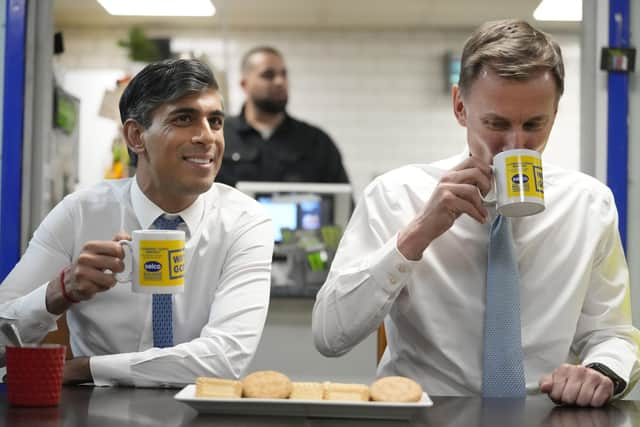The Spring Budget moves us into the realms of science fiction - John McLaren
It is not exactly clear who this Budget was supposed to benefit. It doesn’t do much in the ‘rabbit from a hat’ tax giveaway department, so not much help for the public or the prospects for the current UK Government being re-elected. With pre budget polls putting the Tories on 20 per cent, the lowest since regular polling began in 1978, and thus even lower than under the disaster that was Liz Truss, then two pence off national insurance is not about to revolutionise electoral fortunes. Regardless, the tax burden as a whole is still forecast to rise through to 2028-29, all the Budget did was re-arrange a little who pays - towards non-doms, vapers, oil companies and second home lettors.
It also doesn’t do much to dispel the ‘Government as fantasists’ accusations, as future public spending plans continue to boggle the mind. And such accusations are not just party political, with Richard Hughes, Chair of the Office for Budget Responsibility (OBR), saying of the Autumn Statement “Beyond (2025-26), we know virtually nothing. Some people have referred to that as a work of fiction. That is probably generous, given that someone has bothered to write a work of fiction.” With the OBR now forecasting “no real growth in public spending per person over the next five years” then the Spring Budget moves us into the realms of science fiction.
Advertisement
Hide AdAdvertisement
Hide AdIt was instead another ‘lets do something, anything’ stab in the dark designed to appease, as best it can - which isn’t much - internal and external critics and to turn around the bad polls. What was needed was a well planned, long term, tax strategy. What we got was a desperate ‘fumbling around the back of the sofa’ attempt at finding enough loose change to buy a few sweeties.


The current government is at a loss as to how to address the ‘slow growth/high tax/worsening public services’ trap that the UK finds itself in. The best way to escape such a trap is through a return to higher economic growth, which means improved productivity. But yet again, the OBR’s view is that nothing in the Spring Budget’s set of policies is going to move the dial much on that score. So a reckoning awaits.
The OBR’s report on the Budget estimates that future spending plans imply real terms cuts of between 2.3 and 3.6 per cent a year in the day-to-day budgets of most government public service departments. This wont happen, but the shortfall won’t be addressed until the next Spending Review, post the UK election. At which point someone is going to have to say “well actually…”. Good luck.
Even tougher budget decisions have managed to be avoided of late by the miracle that is ‘fiscal drag’. This phenomenon involves income tax thresholds being held constant in cash terms, rather than rising with inflation, thereby dragging more and more tax payers into higher tax brackets, as well as applying the higher rate to more and more of tax payers rising incomes. Such frozen thresholds have applied since 2022-23 and are intended to run up to 2028-29. In that time the policy is predicted to raise around £45 billion more tax than if thresholds had been inflation linked. To give you some idea of how much it is raking in, obtaining the equivalent in tax revenues through other means would have necessitated the basic rate of income tax rising by around six pence, or by a penny a year. Hands up those who think this would be a vote winner? Thought not. And yet the overall impact of ‘fiscal drag’ on income tax payers is the same, although the distributional impact across households will differ. So long as tax thresholds are frozen then ‘fiscal drag’ will keep pushing the tax burden up, until eventually people catch on that this is also a tax rise, just a bit different form the usual. Then another subterfuge will need to be found.
On prospects for reducing the tax burden, the Chancellor, Jeremy Hunt, declared at the weekend “I’m going to be honest with people on Wednesday that it’s going to be a long path to bring it down. Margaret Thatcher, who was the prime minister who inspired me to go into politics, brought taxes down over a decade.” Yeah, or you could be honest. The next decade has tax rises written all over it, whether due to demographics, defence, levelling up, net zero, the NHS, adult social care, child care, take your pick. It may not be personal taxes, and there may be reductions to some taxes, but overall the burden will continue to rise. On Hunt’s current plans alone it already does for the next five years.
Over the weekend, in response to a ‘gaslighting’ attack, Shona Robison claimed she would give any new money from the Spring Budget to affordable housing, whose budget was cut back just last December. Maybe that’s what Local Government, the NHS and Higher Education should be accusing her of if it gets you to the front of the ‘refunds’ queue. The Scottish Government got £295 million of new money for 2024-25 from the Budget. However, this was largely related to top up day-to-day funding for the the English NHS, in order to avoid a real terms fall this year. Without passing on that extra funding to the NHS in Scotland then its budget would also fall this year, according to the Institute for Fiscal Studies. It would be a ‘brave' minister that made the decision to steer such money away from the NHS in Scotland, especially as performance targets continue to be missed by some distance.
To summarise - we’re still up the creek without much in the way of a paddle, just in a slightly different shaped boat.
Comments
Want to join the conversation? Please or to comment on this article.